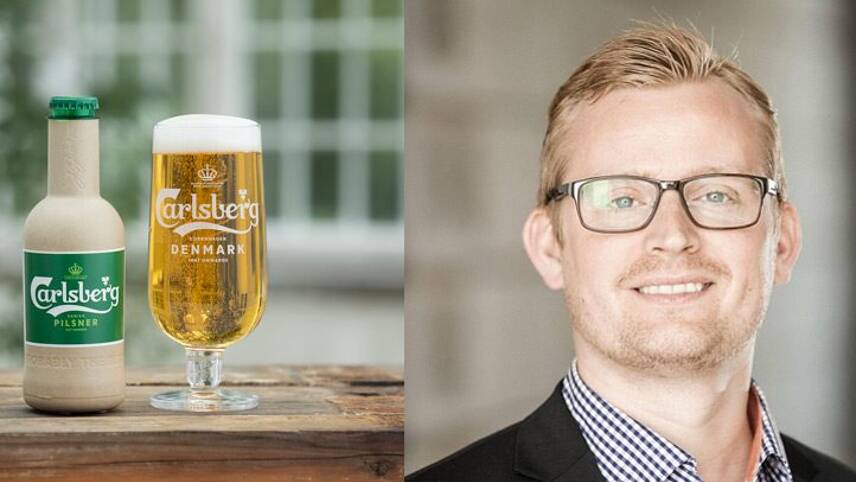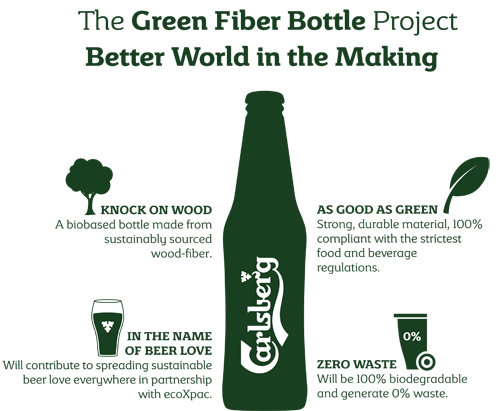Register for free and continue reading
Join our growing army of changemakers and get unlimited access to our premium content

Carlsberg will test the barrier technology with the ambition of being able to commercialise a 100% bio-based bottle that doesn’t contain polymers
Carlsberg launched its Green Fibre Bottle research vision in 2015 to develop a fully recyclable, sustainably sourced bottle made from wood fibre. After working alongside innovation experts ecoXpac, packaging company BillerudKorsnäs, and post-doctoral researchers from the Danish Technical University, the company has today (11 October) unveiled the first prototypes.
The two prototypes consist of sustainably sourced wood fibre with an inner barrier that enables to bottles to contain beer. One version prototype uses a thin recycled PET polymer film barrier, and the other a 100% bio-based PEF polymer film barrier.
According to the company’s sustainability director Simon Boas Hoffmeyer, the prototypes are the first step in a vision that could have a transformational impact across several industries that promotes sustainable packaging as a viable and sought-after choice for consumers.
“This bottle caters to both innovation and sustainability, which is very important,” Boas Hoffmeyer told edie. “This is a totally different experience for the consumer in every single way. Even for people who don’t care too much about sustainability, they will feel and see this is different.
“If we can make this bottle from 100% sustainably sourced wood fibre we have an endless source of renewable material to make bottles from, which is huge. This is a step towards our vision, we don’t want our bottles to contain a polymer, but we need it to for now.”
Carlsberg will test the barrier technology with the ambition of being able to commercialise a 100% bio-based bottle that doesn’t contain polymers.
Boas Hoffmeyer revealed to edie that Carlsberg wanted the bio-based bottles to have the same life-cycle impact of its “most efficient packaging to date”, refillable glass bottles that have a wax coating applied to keep them in circulation for longer – a move that lowers the overall environmental impact of the bottle. In 2016, Carlsberg became the first company in the world to be accredited with a Cradle-to-Cradle (C2C) bronze certification for a glass beverage packaging.
The green fibre bottles also use an “an exceptionally small amount of energy” in the manufacturing phase, Boas Hoffmeyer added.
The Green Fibre Bottles build on Carlsberg’s Together Towards Zero strategy, which targets zero water waste and includes science-based targets aligned to the 1.5C aims of the Paris Agreement as key goals. The strategy includes commitments to zero carbon emissions at its breweries and a 30% reduction in its full value chain carbon footprint by 2030.
Carlsberg has reduced its relative carbon footprint by one-fifth since 2015, putting it on track to meet the carbon goals.
Given that packaging production, disposal and transportation accounted for 40% of Carlsberg’s supply chain emissions in 2015, a further driver of carbon reductions was the introduction of several packaging innovations.
These include Cradle to Cradle Certified™ silver inks on bottle labels, shrink wrap containing at least 50% recycled plastic and the ‘Snap Pack’ concept – where traditional plastic multi-pack packaging is replaced with a recyclable glue that sticks the cans together. The brewer has also redesigned its range of 500ml glass bottles so they weigh 10% less – a move which has helped to decarbonise both the manufacturing and transportation processes.
Introducing Paboco
Much like the Snap Packs, which have proved popular with other manufacturers and brands in the industry, the Green Fibre Bottle will also be examined and evaluated by other corporates.
Carlsberg has also announced the formation of Paboco, the Paper Bottle Company, which is a joint venture between renewables material company BillerudKorsnäs and plastic bottle manufacturing specialist Alpla.
On the day of its formation, Paboco launched a paper bottle community. Carlsberg is one of the founding pioneers of this community and has been joined by The Coca-Cola Company, The Absolut Company and L’Oréal.
The companies will each evaluate the technological performance of paper-based bottles provided by Paboco, with each firm aiming to launch products as part of consumer trials over the next few years.
“We knew we had to find partners and look externally to bring this to life,” Carlsberg’s vice president of group development Myriam Shingleton told edie.
“I’m not sure we realised that our vision from 2015 would also attract these partners, but we were right to go public with our ambition and ask for others to join.
We want to create a better world, and this has to be shared. We understand there are some challenges for the bottles to overcome, and different people need to be engaged. But these challenges can be resolved together.”
edie has spoken to Carlsberg, Paboco and Coca-Cola about the overall aims of the paper bottle community and will publish an exclusive feature shortly.
Matt Mace



Please login or Register to leave a comment.